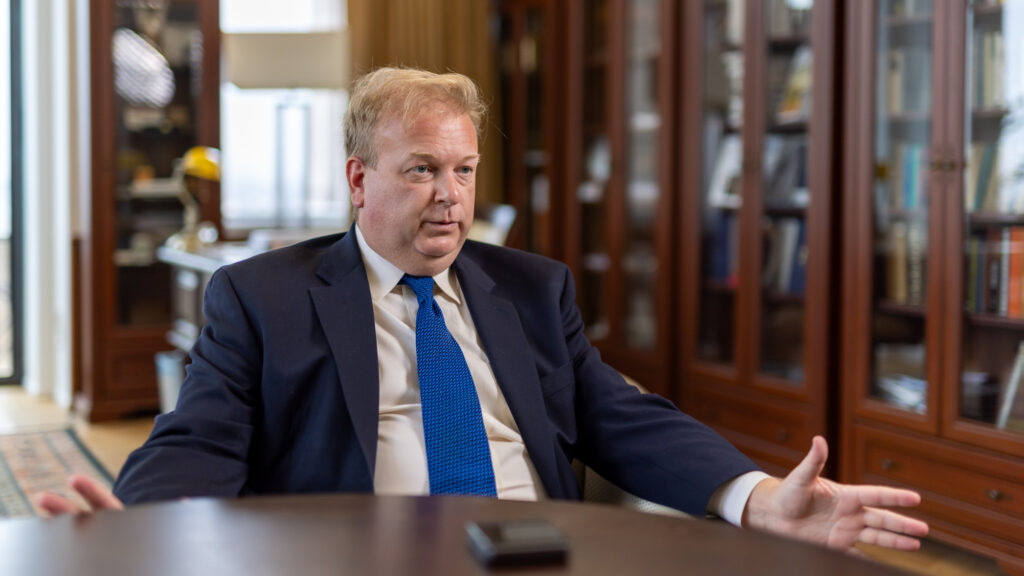Paul du Quenoy is an American publisher, critic, historian, and philanthropist. He serves as the President and Publisher of Academica Press and is also the President of the Palm Beach Institute, a Florida-based organization dedicated to promoting education and public policy that upholds the principles of the American Founding. Recently he visited Budapest to participate in a panel discussion on conservatism in Florida organized by the Danube Institute. During his visit, he also sat down for an interview with Hungarian Conservative, where he discussed how Florida has become a bastion of the American right, the similarities between the policies of DeSantis and Viktor Orbán, and more.
***
Since Mitt Romney’s defeat in 2012 Republicans have won every election in Florida, and the state is increasingly being referred to in the press as a bastion of American conservatism. How did the Sunshine State transform into a stronghold of the American right?
I think Florida has always been a small-c conservative state. Technically, you are right. We have tended to vote for the winner of presidential elections over the last half a century. There’s only one exception to that. That was when first President Bush won the state in 1992, but then he was defeated nationally against Bill Clinton. Otherwise, it’s gone for Clinton, it’s gone for George W Bush twice, then for Obama twice, then for Trump twice, probably for Trump a third time, according to the polling data that we now have. I believe that Florida has a frontier spirit, a focus on individuality, on rigid individualism, on self-reliance, on principles that align very strongly with conservatism. Even then, I think part of the issue here is that there’s a legacy from the time of the Civil War where Democrats controlled state government. That started to change at a much earlier time, actually, in the 1990s. We’ve had a Republican legislature in the state since 1996, and Republican governors consistently since 1999. So for that reason, I would say that we have a conservative polity that is nevertheless occasionally willing to elect or vote for a Democrat. Note that Obama’s victory over Romney was actually very small and that the national votes were much more decisive.
More recently, especially due to Governor Desantis’ policies, which are extremely popular in the nation and indeed around the world, more and more people have come to Florida to benefit from them, to enjoy them. The breakdown of people who are coming into the state—we have pretty good data about this—shows that it’s about two to one in favour of Republicans versus Democrats who moved to Florida. People call them new Floridians. They’re coming in larger numbers. We’ve gone from a state where, when Desantis was elected in 2018, the Democrats had more than 300.000 voters over the Republicans. Now it’s completely reversed. Even more so, we have a million more Republicans than Democrats registered in the state. So it’s become a bastion of conservatism. If you will, a beacon of hope. Some people compare it to the bat sign in Batman.

What specific policies have contributed to the popularity of Governor DeSantis and, consequently, the appeal of Florida?
The policies that are most attractive to a lot of people, of course, had to do with the COVID-19 pandemic. Governor Desantis followed a science-based approach, thus he disagreed with the federal authorities who urged large-scale institutional closures of businesses, of schools, of public facilities. He resisted the idea that you should be confining people into the homes, that you should have mandatory masking. This was very attractive to a large number of Americans and also borne out in the results. If you adjust the mortality rates in COVID for age, Florida’s mortality rate in the pandemic was equal to New York’s. They’re barely distinguished. New York, of course, had a severe lockdown where schoolchildren were not in present at school for two years, where all sorts of restrictions persisted, but we actually still see people today wearing masks. As crazy as that sounds.
In the international press, particularly among European left-leaning outlets, Governor DeSantis is frequently compared to Viktor Orbán. Does this comparison hold merit? In what ways are Florida and Hungary similar?
In Florida, we don’t really call him that. Anyways, I would say that the policies are similar. I don’t know that he’s directly mirrored them or tried to copy Hungary, but I would say that the similarities come down in cultural issues. We have, for example, outlawed transgender surgeries for minors. We’re prohibiting pornographic literature in public schools. We are taking a tough stand on migrants. One of DeSantis’ measures is not to ban immigration, but rather to prohibit the concept, which we have in America, of sanctuary cities, places where governments will not use law enforcement to police migrants. Desantis, I think, shares that with Hungary, that’s very much in the news here today.
‘Florida is not only the fastest growing state by population in America, it’s also the fastest growing economy’
Also there is a general pro-growth low tax policy. Florida, part of that’s Desantis, but part of that’s in the tradition of the state, does not have a state income or inheritance tax. This was established not by law, but by constitutional amendment a hundred years ago. That’s been on the books for a very long time. More recently, Desantis has decreased certain taxes, corporate taxes, as well as licensing fees and administrative costs for Florida residents and has also done rebates on things like public university tuition that have been very popular. There’s an idea that he’s not simply trying to lead in an authoritarian way, as often mentioned by his critics, but that it is actually for the people. This has made him immensely popular. Florida is not only the fastest growing state by population in America, it’s also the fastest growing economy. Our growth rate is 6.4 per cent annually for the last five years. If we were an independent country, we’d be a G20 nation right before Spain.
Could the experiences and policies implemented in Florida serve as a model for the Republican Party in other states across the nation?
Absolutely. President Trump has pledged further rates reductions in national tax and federal taxes in America if he should be re-elected. I think that Republican governors and legislatures who have the will to lead in this way can do that. Some states have already followed Florida’s methods; places like Texas, Iowa, Oklahoma, they’ve adopted similar legislation to what Florida’s doing, and others, I think, would very much like to. And of course, Desantis’ national popularity was of sufficient stature that he was certainly, I would say, the second choice among Republicans for the 2024 presidential nomination, and would probably have won it if President Trump chosen not to run.
Related articles:








